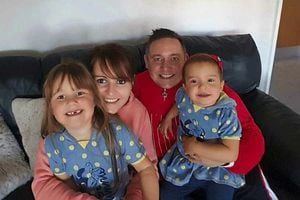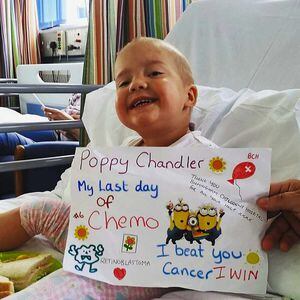Little Poppy is winning her cancer battle
It was first spotted by her doctors in January – a squint in her eye later revealing a rare form of cancer.

Since then, young Poppy Chandler has been receiving chemotherapy for the condition called retinoblastoma.
The cancer occurs while the retina is maturing and affects around only 50 children in Britain each year, usually those under the age of five.
Now, her parents Michelle and Martin, hope she is now well on the road to recovery.

Along with her five-year-old sister Lucie, the family want to now raise awareness of the disease. Mrs Chandler said: "The news we received at the start of the year was just terrible but Poppy is doing really well.
"We're all hoping that despite 2015 beginning on such a low we'll be able to end it on a real high with our little girl being able to ring the bell to signal going into remission."
The rare cancer can affect one or both eyes but, thanks to greater understanding and new methods of treatment, more than 98 per cent of those diagnosed are cured.
Early warning signs include a squint, an abnormal appearance of the pupil that means the affected pupil appears white in flash photographs, poor vision or the coloured part of the eye, the iris, changing colour. Poppy's family are now hoping that in the near future she will be able to ring a special bell in the hospital's oncology department to mark the end of her treatment.
Mrs Chandler added: "We were in shock when it was first mentioned to us that there was a possibility Poppy might have eye cancer.
"It's not something you hear about so we didn't have any real idea what retinoblastoma was.
"In the few days before it was confirmed we had done our own research, so in a way were prepared for what we were told but, obviously, it was still a really tough time.
"However, how it was explained to us at Birmingham Children's Hospital; what it was and the plan for Poppy moving forward, helped us focus on how our little girl was going to get better." A number of factors are taken into account when deciding on treatment including the size of the tumour, whether it affects one or both eyes and possible impact on vision.
Mrs Chandler said Poppy spent several periods in hospital with a high temperature due to the chemotherapy and also had to have blood transfusions. She added: "After the chemotherapy, her blood counts drop. She was more prone to getting ill and infections and she sometimes had a temperature and got poorly."
Dr Helen Jenkinson, lead oncologist for the national retinoblastoma service at Birmingham Children's Hospital, said: "We're delighted to see Poppy doing so well. She's a very brave little girl who has been supported by a wonderful family."





